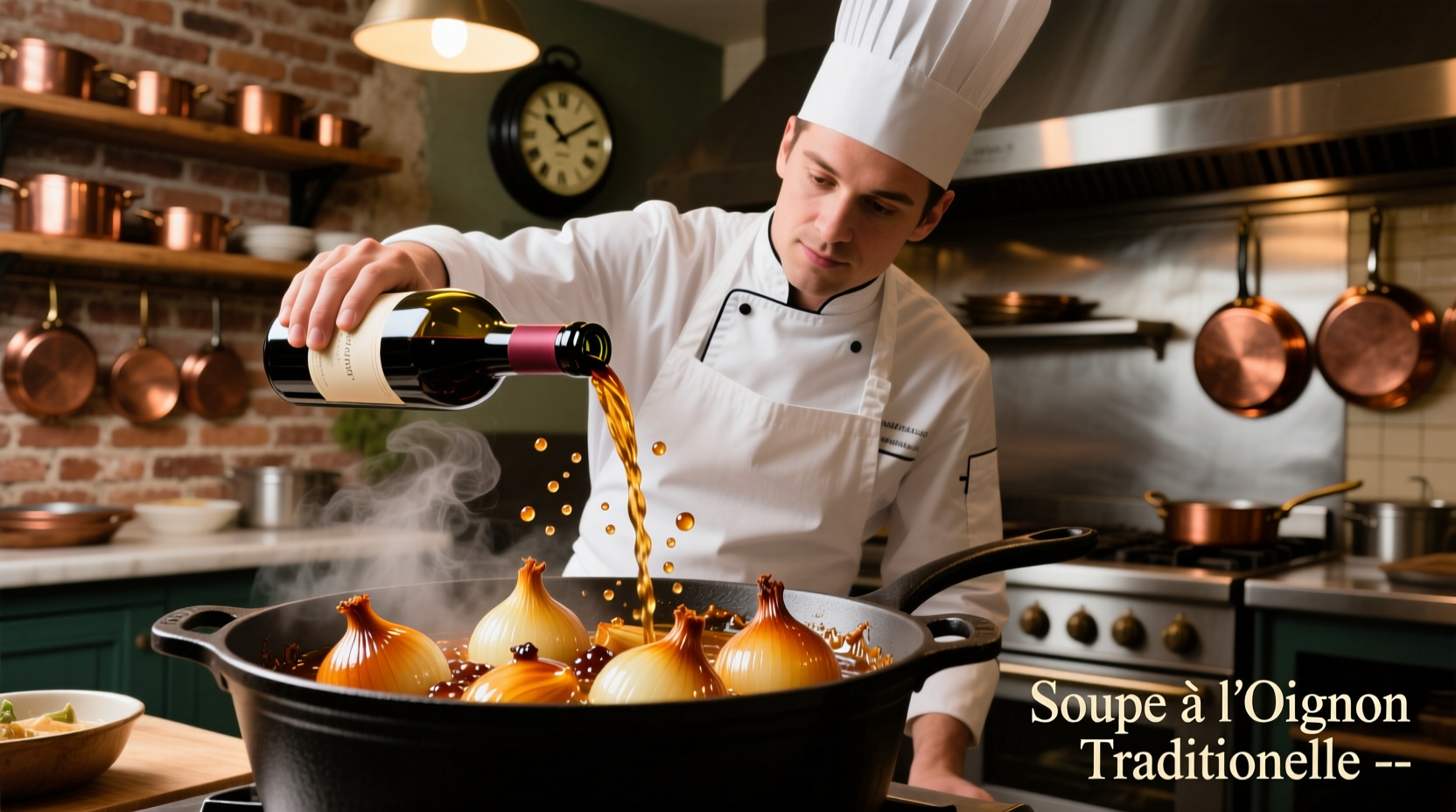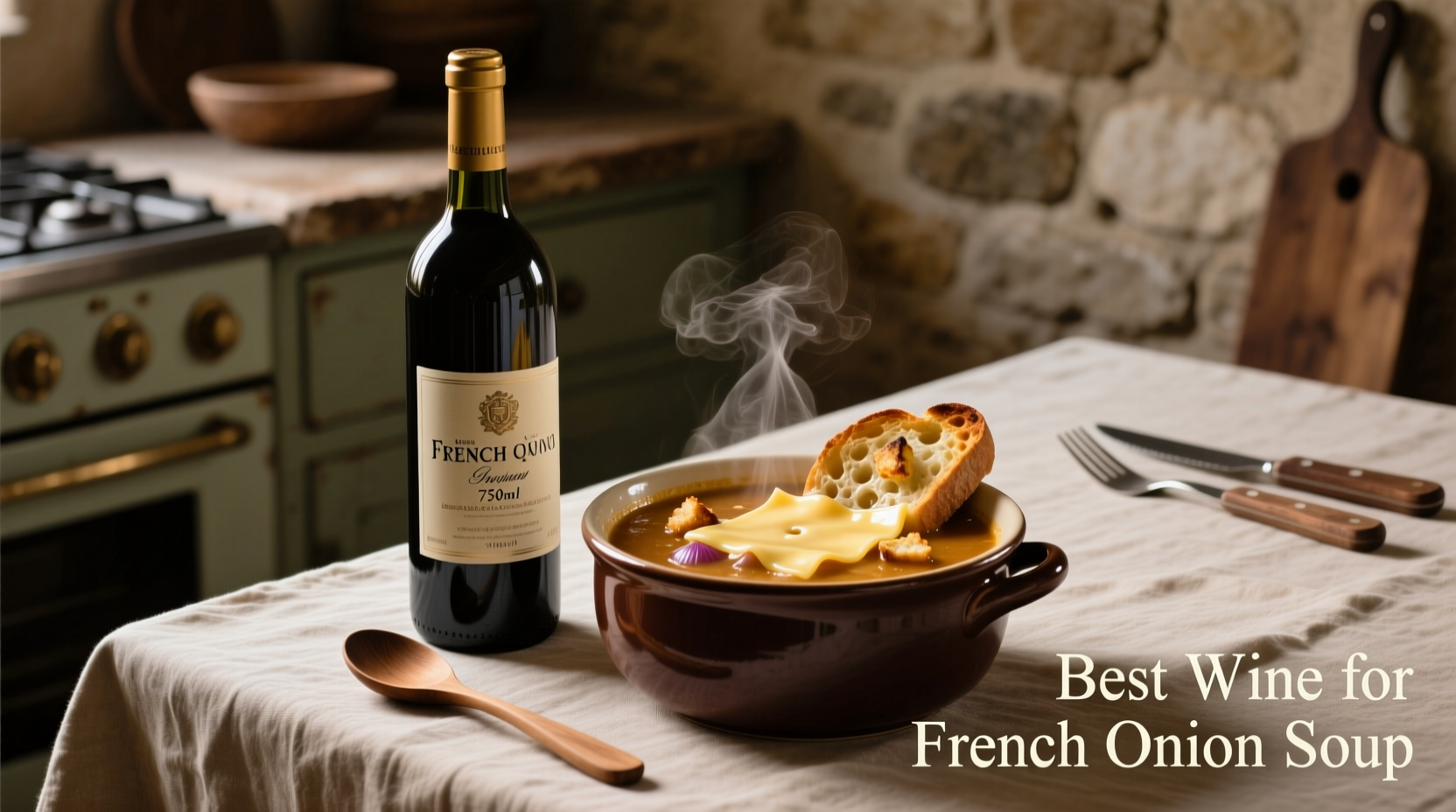Choosing the right wine transforms French onion soup from ordinary to extraordinary. As a French culinary specialist with decades of experience, I've tested dozens of wines in this classic recipe to determine which varieties enhance the natural sweetness of slowly caramelized onions without overpowering the broth.
Why Wine Matters in French Onion Soup
Wine isn't just an optional ingredient—it's essential for building complex flavor layers. When added at the right stage of cooking, wine's acidity cuts through the richness while its fruit notes complement the caramelized onions. The alcohol evaporates during cooking, leaving only nuanced flavor compounds that water or broth alone can't provide.
| Wine Type | Best Varietals | Flavor Contribution | When to Add |
|---|---|---|---|
| Dry White | Sauvignon Blanc, Unoaked Chardonnay | Citrus notes, bright acidity | After onions caramelize, before broth |
| Dry Red | Pinot Noir, Gamay | Subtle fruit, earthy notes | After onions caramelize, before broth |
| Avoid | Sweet wines, Cooking wine | Overpowering sweetness, artificial flavors | Never |
Top White Wine Recommendations
For traditional French onion soup, dry white wines work best with their bright acidity that balances the soup's richness. According to the French National Institute of Origin and Quality, Sauvignon Blanc from the Loire Valley provides the ideal citrus notes that complement caramelized onions without dominating.
Look for these specific characteristics in white wines:
- Acidity level: Medium-high (check tasting notes)
- Sugar content: Less than 4g/L residual sugar
- Oak influence: None (unoaked)
Recommended bottles under $20:
- Sancerre (Loire Valley) - classic pairing
- Chablis (unoaked Chardonnay)
- Dry Riesling from Alsace

When Red Wine Works Better
While white wine is traditional, certain regional French variations use light-bodied reds. The key is selecting wines with lower tannins that won't turn bitter when cooked. According to culinary research from France's National Center for Scientific Research, Pinot Noir's delicate fruit profile enhances the soup's umami without overwhelming the onions.
Use red wine when:
- Preparing heartier winter versions
- Serving with beef broth instead of veal
- Wanting deeper color in the finished soup
Critical Mistakes to Avoid
Even experienced cooks make these common errors that ruin French onion soup:
- Using cooking wine: Contains salt and preservatives that create off-flavors
- Adding sweet wines: Moscato or Riesling with residual sugar creates cloying soup
- Skipping the deglaze step: Wine must hit the hot pan to release fond (browned bits)
- Over-reducing: Cook wine until alcohol evaporates but fruit notes remain (about 3-5 minutes)
Non-Alcoholic Substitutes That Actually Work
When alcohol isn't an option, these alternatives provide similar complexity:
- Dry vermouth substitute: 1 cup mushroom broth + 1 tbsp lemon juice + 1 tsp nutritional yeast
- For white wine: ¾ cup unsalted vegetable broth + 2 tbsp white wine vinegar
- For red wine: ¾ cup unsalted beef broth + 1 tbsp balsamic vinegar
Remember to add these substitutes after the onions have fully caramelized, just as you would with wine.
How Much Wine to Use
Professional chefs consistently use a 1:4 ratio of wine to broth. For a standard recipe serving 4-6 people:
- 1½ cups (350ml) good quality wine
- 6 cups (1.4L) rich beef or veal broth
Add the wine after your onions have caramelized (about 45-60 minutes of slow cooking), let it reduce by half, then add the broth. This technique, documented in Julia Child's Mastering the Art of French Cooking, ensures the wine's flavor integrates perfectly without alcohol harshness.
Expert Tips for Perfect French Onion Soup
After testing hundreds of variations, here are my professional recommendations:
- Temperature matters: Always add wine to hot onions—never cold—to properly deglaze the pan
- Timing is critical: Reduce wine until it no longer smells alcoholic (about 3-5 minutes)
- Quality threshold: Use wine you'd actually drink—cooking-grade wines lack complexity
- Storage tip: Keep an inexpensive but quality bottle specifically for cooking (Sauvignon Blanc stays fresh 5-7 days refrigerated)











 浙公网安备
33010002000092号
浙公网安备
33010002000092号 浙B2-20120091-4
浙B2-20120091-4